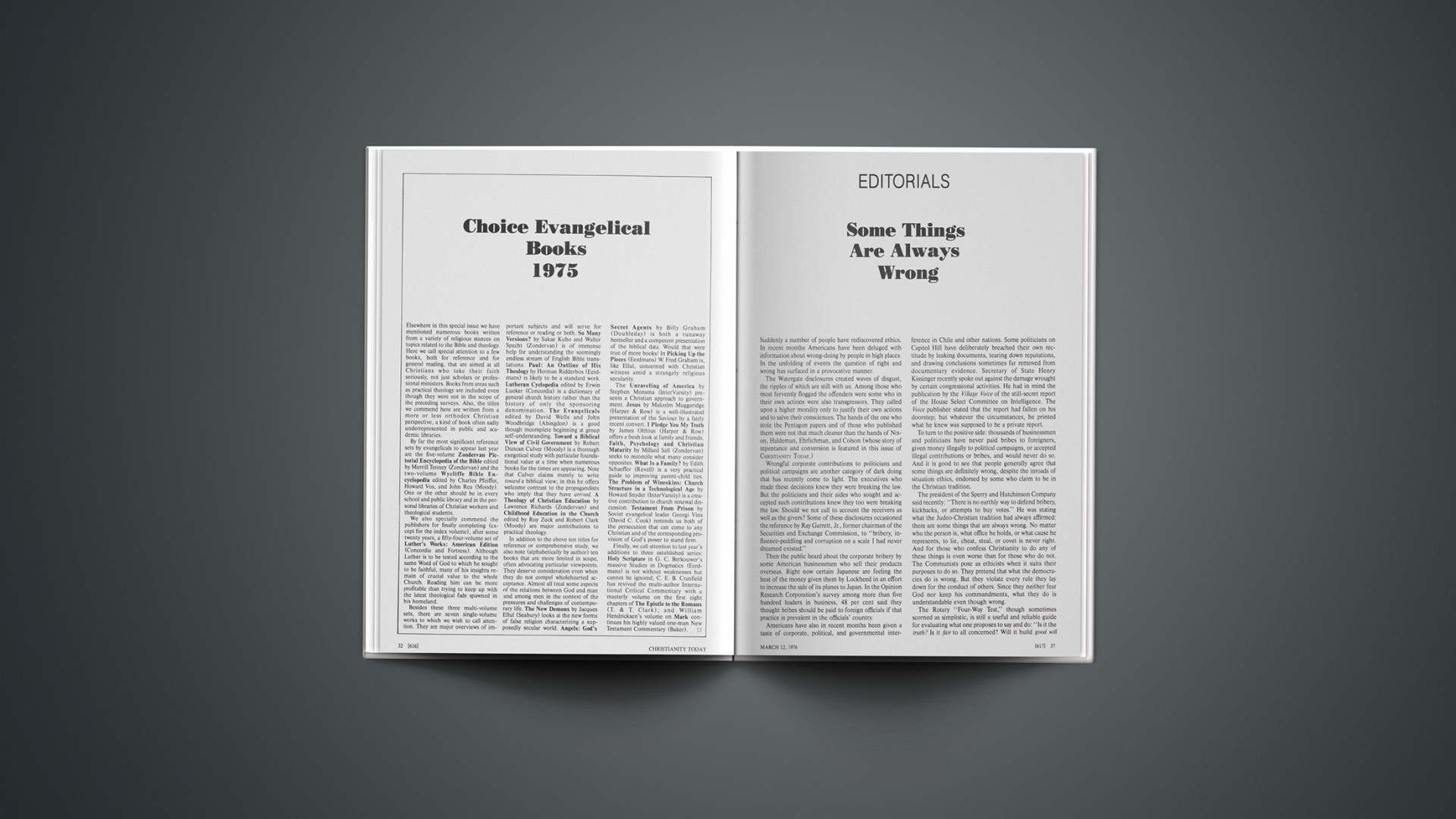Elsewhere in this special issue we have mentioned numerous books written from a variety of religious stances on topics related to the Bible and theology Here we call special attention to a few books, both for reference and for general reading, that are aimed at all Christians who take their faith seriously, not just scholars or professional ministers. Books from areas such as practical theology are included even though they were not in the scope of the preceding surveys. Also, the titles we commend here are written from a more or less orthodox Christian perspective, a kind of book often sadly underrepresented in public and academic libraries.
By far the most significant reference sets by evangelicals to appear last year are the five-volume Zondervan Pictorial Encyclopedia of the Bible edited by Merrill Tenney (Zondervan) and the two-volume Wycliffe Bible Encyclopedia edited by Charles Pfeiffer, Howard Vos, and John Rea (Moody). One or the other should be in every school and public library and in the personal libraries of Christian workers and theological students.
We also specially commend the publishers for finally completing (except for the index volume), after some twenty years, a fifty-four-volume set of Luther’s Works: American Edition (Concordia and Fortress). Although Luther is to be tested according to the same Word of God to which he sought to be faithful, many of his insights remain of crucial value to the whole Church. Reading him can be more profitable than trying to keep up with the latest theological fads spawned in his homeland.
Besides these three multi-volume sets, there are seven single-volume works to which we wish to call attention. They are major overviews of important subjects and will serve for reference or reading or both. So Many Versions? by Sakae Kubo and Walter Specht (Zondervan) is of immense help for understanding the seemingly endless stream of English Bible translations. Paul: An Outline of His Theology by Herman Ridderbos (Eerdmans) is likely to be a standard work. Lutheran Cyclopedia edited by Erwin Lueker (Concordia) is a dictionary of general church history rather than the history of only the sponsoring denomination. The Evangelicals edited by David Wells and John Woodbridge (Abingdon) is a good though incomplete beginning at group self-understanding. Toward a Biblical View of Civil Government by Robert Duncan Culver (Moody) is a thorough exegetical study with particular foundational value at a time when numerous books for the times are appearing. Note that Culver claims merely to write toward a biblical view; in this he offers welcome contrast to the propagandists who imply that they have arrived. A Theology of Christian Education by Lawrence Richards (Zondervan) and Childhood Education in the Church edited by Roy Zuck and Robert Clark (Moody) are major contributions to practical theology.
In addition to the above ten titles for reference or comprehensive study, we also note (alphabetically by author) ten books that are more limited in scope, often advocating particular viewpoints. They deserve consideration even when they do not compel wholehearted acceptance. Almost all treat some aspects of the relations between God and man and among men in the context of the pressures and challenges of contemporary life. The New Demons by Jacques Ellul (Seabury) looks at the new forms of false religion characterizing a supposedly secular world. Angels: God’s Secret Agents by Billy Graham (Doubleday) is both a runaway bestseller and a competent presentation of the biblical data. Would that were true of more books! In Picking Up the Pieces (Eerdmans) W. Fred Graham is, like Ellul, concerned with Christian witness amid a strangely religious secularity.
The Unraveling of America by Stephen Monsma (InterVarsity) presents a Christian approach to government. Jesus by Malcolm Muggeridge (Harper & Row) is a well-illustrated presentation of the Saviour by a fairly recent convert. I Pledge You My Troth by James Olthius (Harper & Row) offers a fresh look at family and friends. Faith, Psychology and Christian Maturity by Millard Sall (Zondervan) seeks to reconcile what many consider opposites. What Is a Family? by Edith Schaeffer (Revell) is a very practical guide to improving parent-child ties. The Problem of Wineskins: Church Structure in a Technological Age by Howard Snyder (InterVarsity) is a creative contribution to church renewal discussion. Testament From Prison by Soviet evangelical leader Georgi Vins (David C. Cook) reminds us both of the persecution that can come to any Christian and of the corresponding provision of God’s power to stand firm.
Finally, we call attention to last year’s additions to three established series: Holy Scripture in G. C. Berkouwer’s massive Studies in Dogmatics (Eerdmans) is not without weaknesses but cannot be ignored; C. E. B. Cranfield has revived the multi-author International Critical Commentary with a masterly volume on the first eight chapters of The Epistle to the Romans (T. & T. Clark); and William Hendricksen’s volume on Mark continues his highly valued one-man New Testament Commentary (Baker).










